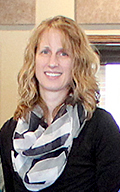
Elizabeth Schear was the director at Rock County Opportunities for over 15 years, building clientele and community jobs and improving program offerings.
“I’m handing over my baby … 15 years of hard work,” she said in August, just before leaving for a career change.
“I’ve worked really hard here, and I’m really proud of what I’ve done here.”
When she started in 2005, RCO (then the Developmental Achievement Center) had 28 clients.
“At one point before Covid, we were up to almost 60 clients. So we more than doubled the clients that we had,” Schear said.
In that time the cash reserves also doubled, providing for RCO’s long-term sustainability.
“We’ve grown very solid, with immense programming here that’s top-notch for the southwest corner of Minnesota for people with disabilities,” Schear said.
“RCO is in a really great place. They’ve got a lot to work with. They’ve got a great stable, well-liked program. People come from all over southwest Minnesota to come down here.”
Schear said she feels like she’s leaving the program in a good place.
“It’s time for me to move on to the next project and the next challenge and develop something similar in another town.”
That town will be Marshall, where she’s accepted the director’s position at Advance Opportunities. She’ll continue living in Luverne and will commute full time.
“I’ve been helping them on an interim basis through the whole pandemic,” Schear said. “They need some rebuilding. There’s lots of opportunity for growth there that I’m looking forward to.”
This is the sort of challenge she said she embraced when she started in Luverne.
“When I started here, my mantra was, ‘I don’t even know what I don’t know.’ It is so complex; this field and industry is so complicated,” Schear said.
“You have multiple government state agencies that you report to and have compliance to maintain with. And continually changing funding sources and rules and regulations. And needs and desires are constantly changing of your clients whose health needs change.”
Also she said the workforce crisis affects programs like RCO’s – like all other employers.
“When we’re in the employment field for people with disabilities and you’ve got a workforce crisis … you rely on people to work to help others get work,” she said.
“Those are the challenges – to find the right fit for the people who want to work, and to find the funding and the staffing to find the level of support that they need.”
And there are continually changing political arguments, such as the current issue of sub-minimum wage and the need to protect disabled adults from being taken advantage of with jobs paying 30 cents per hour.
“That sounds horrible, but you have to look at the whole big picture and understand what happens when we take away the in-house work here,” she said.
“And there’s a moratorium right now that people can only work here for three years. After that they’re expected to get a job in the community.”
The problem is not every building in town is handicapped-accessible or has the work or the space, and clients need one-to-one support staff.
“It costs taxpayers $30 per hour to pay someone to help with a $10-per-hour job,” Schear said.
“Whereas in the building here, we bring in the work. We have everything we need here.”
She mentioned the lift and the large bathroom, the medical training and multiple staff with multiple eyes, to work in a group of one to four or one to five.
“It’s a lot cheaper to support five individuals, plus they get the socialization that they’re not necessarily going to get working somewhere in the community,” Schear said.
Her new role in Marshall will present many of the same challenges, but she said she’s ready for that.
“I want to lead an agency that provides top-notch services for people with disabilities,” she said. “For the next few years that will be in Marshall.”
As for her family at RCO:
“It has been the privilege of a lifetime to serve the clients in this county for the 15 1/2 years that I did. I have learned so much from them,” she said.
“I’m a completely different person from when I first started here. I have a much deeper appreciation of the challenges people with disabilities endure and face every day.”


